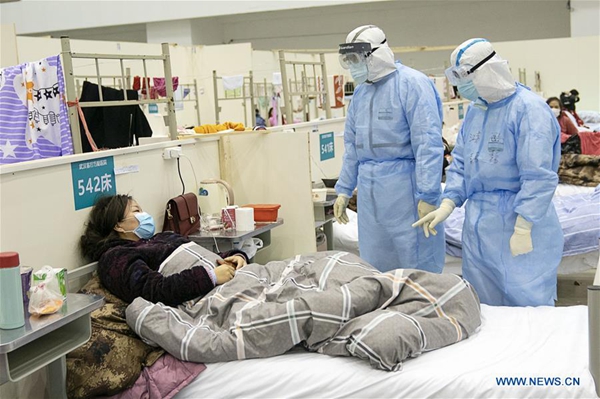Winning a war without smoke
- By George N. Tzogopoulos
 0 Comment(s)
0 Comment(s) Print
Print E-mail China.org.cn, February 19, 2020
E-mail China.org.cn, February 19, 2020

The 56th Munich Security Conference took place at an unusual moment for China. The outbreak of the new coronavirus interrupted the smooth daily routine and required immediate action and difficult, but wise decisions.
The participation of State Councilor and Minister of Foreign Affairs Wang Yi in the prestigious event of Munich was thus a good opportunity for the world to hear a review of the situation amid the somewhat unbalanced news reports of Western media.
On the whole, this coverage includes two predictable characteristics: The first is the typical fear mediation of epidemics that crises normally incite; the second is the recurrent ideological bias that often leads to an unfair and exaggerated criticism of the Chinese government.
Early research demonstrates that the volume of articles on the virus in some countries, for example, in the U.K., is much higher in comparison to other public health threats such as the Ebola outbreak.
In his speech in Munich, Wang Yi presented a picture of a country fighting a war without smoke by being fully conscious of responsibilities beyond national borders. Numerous people are devoted soldiers in the battle, including doctors, researchers, scientists, engineers and construction workers. It also includes ordinary citizens who patiently stay at home, cancel their business trips and see their companies suffer economic losses.
China is grateful to countries offering humanitarian assistance or expressing solidarity. Wang Yi made specific references to some of these, such as the Republic of Korea, Sri Lanka and Russia. Additional examples can be mentioned.
France deserves a special credit. While many diplomats have already left Wuhan, French Consul General Olivier Guyonvarch and his colleagues decided to stay and strengthen cooperation with Chinese authorities. A friend in need, is a friend indeed.
Effective measures and enhanced international collaboration yield results. The spread of the virus to other countries has been significantly curbed.
China mourns virus-related fatalities at home and abroad. And it remains highly concerned about the potential recovery of hospitalized patients. However, as long as the heroic fight against the epidemic continues, signs of success indeed do exist.
A John Hopkins University database revealed 9,871 people had recovered by February 16. The same database also showed a slow but steady growth rateinthis regard. Against this backdrop, Wang Yi said that the number of confirmed cases outside Hubei had dropped for 12 consecutive days.
A look into the history of China exhibits that the country has never lacked resilience in overcoming problems and its citizens have never sacrificed their pride and dignity. Western media overlook the rich Chinese history, the importance of the CPC for China's unity and the mentality of ordinary Chinese citizens.
Instead, they tend to predict chaos and a looming confidence crisis every time a problem emerges. Failures in predictions, however, are already obvious. According to most Western commentators, for example, the Chinese economy should have collapsed in the summer of 2015 when the New Normal policy caused some turbulence.
The Chinese leadership does not hide the truth from the Chinese people. When the present virus is controlled, economic challenges due to the ongoing turmoil will have to be addressed. The expected stimulus of the economy will have to be well-researched and targeted.
Balanced choices without unnecessary fiscal expenditure accumulating new debts will be the principal priority in order for general belt-tightening to be avoided. Such a policy will complement the reduction of the tax burden of enterprises that will normally continue during the year.
Chinese people who recently saw their average annual national income reach the threshold of $10,000, can understand the importance of some temporary adjustments that will not change the dynamic course of the national economy.
"After the storm, comes the rainbow," said Wang Yi. He is right. China will emerge stronger, more self-confident and prouder for acting responsibly in world affairs. Ironically, the elimination of the new coronavirus will possibly push supporters of the decoupling scenario – who already see the global economic consequences of the problem in various fronts – to reconsider their approach and preserve the globalization process. Theory is easier than practice.
George N. Tzogopoulos is a columnist with China.org.cn. For more information please visit:
http://91dzs.com/opinion/GeorgeNTzogopoulos.htm
Opinion articles reflect the views of their authors, not necessarily those of China.org.cn.
If you would like to contribute, please contact us at opinion@china.org.cn.





